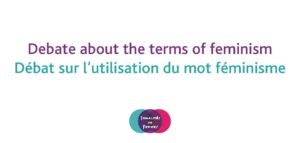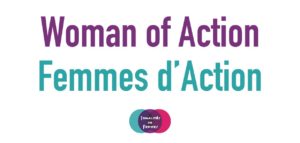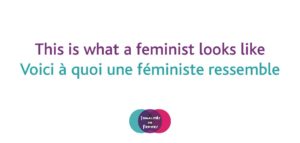
This debate between Sonia Johnson and Chiara Gerlich was started in February in preparation for International Women’s day, which is special for us because we celebrate women on our platform and because it also marks the 7th anniversary of when “Tonalités de Femmes” (TdF) was brought to life.
Sonia Johnson : Today I feel like declaring that I am not using the word feminist, but that I love and appreciate women in all their richness. I grew up with three brothers who shared all the daily chores with me, with a mother who has been the perfect role model in all areas of life (a feminist). Furthermore, I am in a balanced relationship and I always chose the direction my career would take.

In Europe of the 21st century a woman can be free in her decisions, women can get educated, travel, vote, protect themselves sexually, have access to contraception and decide whether to become a mother or not. Women can also adopt and get married to another women. For all these revolutions, for all these historical advances of Western women, I admire the feminists of the past.
Chiara Gerlich : ‘Tonalités de Femmes’ confirms that you had already great trust and confidence in women ?
Sonia Johnson : Yes, with TdF I wanted to show my confidence in women in general and in the women I meet for this project in particular. I simply have faith in them, their judgement, their actions.
Chiara Gerlich : For you what are the main problems women face because of their gender?
Sonia Johnson : It is not easy to reach the highest positions, to confront perpetual chauvinism from colleagues, to reconcile personal and professional life, but every one of us is fighting this battle with courage and since 2010 I have the desire to highlight women while listening and exposing their struggles.
Dear Chiara, I sense an anger, a frustration, a feminism that is rooted inside you, what is it exactly?
Chiara Gerlich : Merci Sonia! Thank you for your words and your question. Indeed there is a frustration and an anger inside of me, which I can even feel rising up in my belly right now as I write. It is something I look forward to exploring further throughout our debate here. As I am convinced the fight for equality between the sexes is not over, I call myself a feminist and believe it is a word we, unfortunately, still need.

I see the problem with the word feminist on the one hand as one of stigma. It is not a popular or friendly term to use for oneself, as it highlights oppression, may seem rebellious and opposes the status quo. Some may even perceive it as aggressive. On the other hand it is seen as a divisive term, which makes men the villains and women the victims. This understanding is, of course, entirely unhelpful as it takes agency away from women and makes individual men feel blamed, who are in and of themselves not keeping the structural inequalities women face in place. Furthermore, men can also be seen as victims of the world we live in. They can be or feel limited in their self expression and possibilities.
Sonia Johnson : You have a very important international experience and rich personal life, so I believe that this is also why this word means a lot for you?
Chiara Gerlich : Indeed, and I also understand the hesitation to use the term, but still believe we have to understand the situation of structural and systematic inequality women face within public life, the family and the workplace. Inequality is what we are facing and as feminists highlighting and uncovering.
Does the problem with the term feminism for you maybe stem from the fact that you do not find it useful to describe the struggles you mention, like confronting machismo or reconciling professional and private life?
Sonia Johnson : Yes, you are right, these struggles don’t seem to correspond to the kind of modern feminism of groups of women who are demanding and aggressive. Because I strongly believe that in the 21st century women will win all their battles, among them those against domestic violence and precariousness. Their strength and their weakness will be shared with men. Tomorrow the feminine and the masculine will interact with each other everywhere and at all levels. The rules will lose their relevance, a girl will be able to play soccer, a boy will be able to become a health care worker without anybody being shocked. So why should we create opposing groups? And above all else, men who will be working in these chauvinistic sectors, who are not respecting genders pay equity, who are making sexist jokes which are so old school, in fact these men will be our sons. I have two of them in my house. We are educating our children by giving the reflection of this changing society. And it is this strength, which I believe in.






“Oui je pense aussi que le mot féminisme peut-être clivant dans la société d’aujourd’hui, car il revêt plusieurs réalités différentes et n’est pas forcément compris par chacun de la même façon. Il est par ailleurs souvent connoté négativement, pour décrire une sorte de lutte armée des femmes pour exister, sans nuances. Le contexte historique est important aussi, oui. Pour moi le combat des femmes doit être une attitude, une manière d’être appuyée par des actions, mais il ne doit pas forcément être étiqueté au risque de mauvaise interprétation.”
“Je soutiens l’association ‘Ni Putes, ni Soumises'”
I have proudly read your International Women’s Day with great joy. Congratulations, do keep it up.
Je travaille beaucoup pour ma famille. Je n’ai jamais eu l’occasion de me poser ces questions sur le féminisme. Ce que je sais, c’est que si j’assiste à un conflit entre un homme et une femme, j’aiderai instinctivement la femme. En Moldavie, la journée de la Femme est créée pour lui rendre hommage, alors on offre un cadeau à sa grand-mère, sa mère ou sa femme.